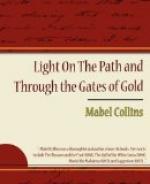CHAPTER II
THE MYSTERY OF THRESHOLD
I
There is no doubt that at the entrance on a new phase of life something has to be given up. The child, when it has become the man, puts away childish things. Saint Paul showed in these words, and in many others which he has left us, that he had tasted of the elixir of life, that he was on his way towards the Gates of Gold. With each drop of the divine draught which is put into the cup of pleasure something is purged away from that cup to make room for the magic drop. For Nature deals with her children generously: man’s cup is always full to the brim; and if he chooses to taste of the fine and life-giving essence, he must cast away something of the grosser and less sensitive part of himself. This has to be done daily, hourly, momently, in order that the draught of life may steadily increase. And to do this unflinchingly, a man must be his own schoolmaster, must recognise that he is always in need of wisdom, must be ready to practise any austerities, to use the birch-rod unhesitatingly against himself, in order to gain his end. It becomes evident to any one who regards the subject seriously, that only a man who has the potentialities in him both of the voluptuary and the stoic has any chance of entering the Golden Gates. He must be capable of testing and valuing to its most delicate fraction every joy existence has to give; and he must be capable of denying himself all pleasure, and that without suffering from the denial. When he has accomplished the development of this double possibility, then he is able to begin sifting his pleasures and taking away from his consciousness those which belong absolutely to the man of clay. When those are put back, there is the next range of more refined pleasures to be dealt with. The dealing with these which will enable a man to find the essence of life is not the method pursued by the stoic philosopher. The stoic does not allow that there is joy within pleasure, and by denying himself the one loses the other. But the true philosopher, who has studied life itself without being bound by any system of thought, sees that the kernel is within the shell, and that, instead of crunching up the whole nut like a gross and indifferent feeder, the essence of the thing is obtained by cracking the shell and casting it away. All emotion, all sensation, lends itself to this process, else it could not be a part of man’s development, an essential of his nature. For that there is before him power, life, perfection, and that every portion of his passage thitherwards is crowded with the means of helping him to his goal, can only be denied by those who refuse to acknowledge life as apart from matter. Their mental position is so absolutely arbitrary that it is useless to encounter or combat it. Through all time the unseen has been pressing on the seen, the immaterial overpowering the material; through all time the signs and tokens of that which is beyond matter have been waiting for the men of matter to test and weigh them. Those who will not do so have chosen the place of pause arbitrarily, and there is nothing to be done but let them remain there undisturbed, working that treadmill which they believe to be the utmost activity of existence.




